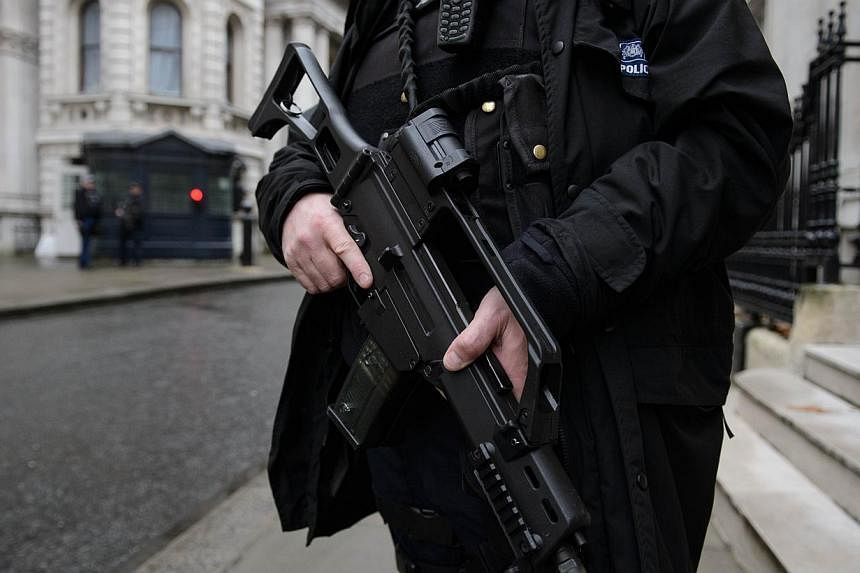LONDON (AFP) - Britain on Wednesday unveiled draft legislation to ban extremist preachers from universities, increase surveillance on suspected radicals and stem the flow of militants joining the Islamic State in Iraq and Syria group.
The Counter-Terrorism and Security Bill has already come under criticism from Muslim rights campaigners and civil liberties groups who have raised concern about measures not subject to review by the courts.
"We are in the middle of a generational struggle against a deadly terrorist ideology," Britain's interior minister, Theresa May, said.
"In an open and free society, we can never entirely eliminate the threat from terrorism. But we must do everything possible in line with our shared values to reduce the risks," she said.
One of the most contested proposals is a ban for Britons suspected of fighting in Iraq and Syria from re-entering the country for up to two years unless they agree to be subjected to strict monitoring.
Critics have said these "temporary exclusion orders" come close to making British citizens "stateless", a breach of international law that could also create a headache for transit states like Turkey.
The laws would give Britain's interior minister sweeping powers, including on deciding the definition of extremist speech - a landmark step in a country that has long prided itself on free speech.
Police will also have the power to seize passports and travel documents of people thought to be going abroad to engage in terrorism and relocate terror suspects to different parts of the country.
David Anderson, the independent reviewer of anti-terror legislation, criticised the plans.
"Where are the courts?" he asked at a parliamentary committee on human rights, adding that there may be a "more sensible" way of dealing with those suspected of terrorist activity.
"The role of the courts... is important if you don't want these laws being abused," said Simon Palombi, a consultant for the international security department at the Chatham House think-tank.
Palombi said the "most controversial" measure was obliging Internet service providers to hand over data on Internet Protocol (IP) addresses to trace individual smartphone and computer users.
Making schools and universities legally liable for helping to deter radicalisation was also "a very slippery slope", he warned.
"I think you are going to find a lot of opposition there," he said.
'SINGLED OUT'
Muslims in Britain, meanwhile, said they felt singled out and labelled the planned legislation divisive and rushed.
Said Fatimah Ali, 46, a nurse in London: "For us to live in the same community and work together, we have to fight together. I think these laws will separate us.
"I think they were made too hastily," she said.
Britain has around 2.8 million Muslims, making up 4.4 per cent of the population, and many are concentrated in London in ethnically diverse areas like Whitechapel where Ali works.
The area is home to the East London Mosque, billed as the city's oldest and as serving the country's largest Muslim congregation.
Stalls line the streets near the mosque selling headscarves and long robes, and most shops nearby sell either Halal food or Islamic books.
A short walk down the road is Aldgate tube station, site of one of a series of coordinated bombings that killed 52 people in London in 2005, carried out by four radicalised young Muslim men.
"I don't think they can stop the terrorists with this law," said market trader Mohammed Ali, 55, against a backdrop of multi-coloured and sequined cloths.
"This law targets the Muslim community... Just because one part of the community is criminal, it doesn't make the whole community criminal," he said.
There is broad support from the main parties in parliament for the draft Bill, which also includes the establishment of a civil liberties panel to monitor implementation.
But campaign groups like Liberty, the Islamic Human Rights Commission (IHRC) and CAGE have already come out against the Counter-Terrorism and Security Bill, defining it as hasty and counter-productive.
"The new anti-terror drive seems to be more geared to creating otherness in our society than security," IHRC chairman Massoud Shadjareh told AFP.
"I don't think there has been any consultation with the Muslim community," he said, adding: "The consultation seems to be only with a narrow group of people who think like the government."
The Muslim Council of Britain, the largest national association of British Muslims has not commented on the proposals so far but has lobbied against parts of existing anti-terror legislation.
"One of the best repudiations we can give to terrorists is by ensuring that we will not curtail our cherished freedoms which they wish to destroy," the Council's secretary-general Shuja Shafi said earlier.
Security services say they are struggling with a rising tide of Islamic radicalisation, fuelled by wars in Syria, Iraq and Afghanistan, and fear that Britons who have gone to fight in those conflicts may return to conduct attacks on British soil.
The government estimates around 500 Britons have joined the Islamic State militants in recent months and one of the group's executioners - seen in a series of grisly videos - has a British accent.
In Whitechapel, Javad Iqbal, 51, another market trader, agreed with the purpose of the legislative proposals but said they risked stigmatising Muslims.
"I do understand where they're coming from, why they want to toughen laws, because of a very small minority of so-called Muslims," he said.
Careworker Mohammad Haque, 35, said radicalisation could not be separated from Western involvement in Muslim countries, or the poverty that blights many Muslim communities in Britain.
"They have to go to the root of the problem.
"They have to give Muslims more opportunities. We need equality in the job market so they don't think about extremism. When people are young and jobless they think in a wrong way."

